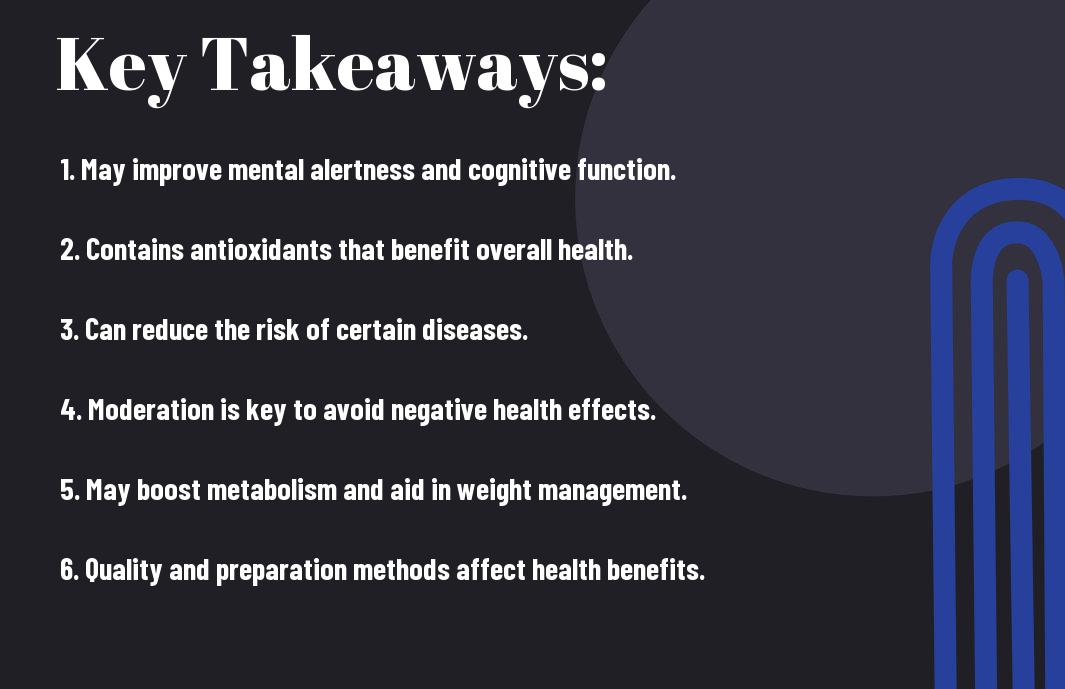Coffee, a beloved morning ritual for many, has long sparked debates about its impact on health. In this article, we will investigate into the research behind coffee consumption and its potential health benefits or drawbacks. Let’s uncover the truth behind whether your daily cup of joe is actually good for you.
Key Takeaways:
- Antioxidants: Coffee is a major source of antioxidants, which help protect cells from damage and reduce inflammation in the body.
- Brain Function: The caffeine in coffee can improve brain function, including memory, mood, and overall mental performance.
- Heart Health: Moderate coffee consumption has been linked to a reduced risk of heart disease and stroke.
- Metabolic Boost: Coffee can help boost metabolism, aiding in weight management and promoting fat burning.
- Longevity: Studies have suggested that coffee drinkers may have a lower risk of certain diseases and a longer lifespan compared to non-coffee drinkers.

The History of Coffee and Health
Ancient Civilizations and Coffee Consumption
With a history dating back to the 9th century, coffee has been a beloved beverage across various ancient civilizations. It was revered for its stimulating effects and soon became an integral part of social and cultural practices in regions where it was cultivated.
Legend has it that the energizing properties of coffee were first discovered by an Ethiopian goatherd named Kaldi, who noticed his goats became lively after consuming coffee berries. This led to the spread of coffee consumption in the Arab world and eventually to Europe and the rest of the world.
The Rise of Coffee in Europe and Its Perceived Health Effects
With the introduction of coffee in Europe during the 17th century, it quickly gained popularity for its purported health benefits. Coffeehouses became hubs of intellectual exchange and social gatherings, with many believing that coffee could improve digestion, sharpen the mind, and even cure ailments.
Coffee was often hailed as a miraculous elixir that could alleviate various health issues, leading to its widespread consumption among the European population. While some skeptics warned of its potential harmful effects, the allure of coffee’s stimulating properties prevailed, shaping its enduring reputation as a beverage that not only invigorates the senses but also offers health benefits.
Caffeine: The Good, the Bad, and the Ugly
The Stimulating Effects of Caffeine on the Body
Caffeine, a natural stimulant found in coffee, has several positive effects on the body. According to a recent article on Eating Well, caffeine can improve focus, increase alertness, and even enhance physical performance. When you drink coffee, caffeine is quickly absorbed into the bloodstream and travels to the brain, where it blocks the inhibitory neurotransmitter adenosine, leading to a boost in other neurotransmitters like dopamine and norepinephrine.
The Potential Negative Side Effects of Caffeine
Any substance that has the power to stimulate the central nervous system can also have negative side effects if consumed in excess. While moderate coffee consumption is generally considered safe for most people, excessive intake of caffeine can lead to negative side effects such as insomnia, jitteriness, increased heart rate, and digestive issues. It’s important to be aware of your body’s tolerance to caffeine and consume it in moderation to avoid these potential side effects.
The potential negative side effects of caffeine can vary from person to person based on factors like age, weight, tolerance levels, and overall health. Some individuals may experience anxiety or heart palpitations even with small amounts of caffeine, while others may be able to consume large quantities without any adverse effects. It’s crucial to listen to your body and adjust your caffeine intake accordingly to maintain a healthy balance.

Coffee and Cardiovascular Health
The Relationship Between Coffee Consumption and Heart Rate
To understand the relationship between coffee consumption and heart rate, researchers have conducted numerous studies over the years. The findings suggest that moderate coffee intake is generally safe for the heart and may even have some benefits. However, excessive consumption of caffeine can lead to an increase in heart rate, especially in individuals who are sensitive to caffeine.
The Impact of Coffee on Blood Pressure and Cardiovascular Disease
Pressure on blood vessels and increased risk of cardiovascular disease are often concerns associated with coffee consumption. Some studies have shown a slight increase in blood pressure after consuming coffee, but the effect is usually temporary. With respect to the long-term impact on cardiovascular disease, research results have been conflicting. Some studies suggest a potential protective effect of coffee against certain heart conditions, while others indicate a possible increased risk.
Understanding the complexities of how coffee affects blood pressure and cardiovascular health requires further research to draw definitive conclusions. Factors such as genetics, overall diet, and individual caffeine sensitivity play a role in how coffee influences heart health. It is necessary for individuals to listen to their bodies and monitor their coffee intake to maintain a healthy heart.
Coffee and Cognitive Function
Now let’s explore into the fascinating relationship between coffee consumption and cognitive function.
The Effects of Caffeine on Alertness and Focus
Effects of caffeine on alertness and focus have been well-documented in numerous studies. The stimulant properties of caffeine can help increase alertness, improve attention span, and enhance focus. Many people rely on their morning cup of coffee to kickstart their day and sharpen their cognitive abilities.
The Potential Link Between Coffee Consumption and Neurodegenerative Diseases
Diseases like Alzheimer’s and Parkinson’s are a significant concern as people age. Researchers have been exploring the potential link between coffee consumption and a reduced risk of developing neurodegenerative diseases. Preliminary studies suggest that coffee drinkers may have a lower risk of these conditions, thanks to the neuroprotective properties of compounds found in coffee.
Between the caffeine content and the antioxidants present in coffee, there may be promising connections to preserving cognitive function and potentially reducing the risk of neurodegenerative diseases. While more research is needed to solidify these findings, it’s encouraging to think that our daily coffee habit could be benefiting our long-term brain health.
Coffee and Cancer Risk
The Controversy Surrounding Coffee and Cancer
Your morning cup of coffee may be a daily ritual, but have you ever wondered about its impact on your health? The relationship between coffee consumption and cancer risk has been a topic of debate and research for years. Some studies have suggested that coffee could potentially increase the risk of certain types of cancer, while others have found no significant association.
With conflicting findings and limited consensus among experts, it can be confusing for the average consumer to decipher the true risks associated with coffee consumption. Factors such as the type of coffee, brewing method, and individual genetic predisposition may all play a role in the potential impact of coffee on cancer risk.
The Latest Research on Coffee Consumption and Cancer Risk
The ongoing research on coffee and its potential effects on cancer risk continues to evolve. Recent studies have provided some insight into the relationship between coffee consumption and various types of cancer. The findings have been mixed, with some suggesting a possible protective effect of coffee against certain cancers, while others have raised concerns about potential risks.
For instance, a study published in the International Journal of Cancer found that moderate coffee consumption was associated with a lower risk of developing liver cancer. On the other hand, a meta-analysis published in the Journal of Cancer Research and Clinical Oncology highlighted a potential increased risk of bladder cancer with high coffee intake. As researchers probe deeper into this complex relationship, more clarity may emerge on the true impact of coffee on cancer risk.
Coffee and Other Health Benefits
For Coffee and health: What does the research say?, the relationship between coffee consumption and health is a topic of ongoing research. Studies have shown that coffee, when consumed in moderation, may have some health benefits. These benefits are attributed to the antioxidants present in coffee, which can help protect cells from damage caused by free radicals.
The Antioxidant Properties of Coffee
To investigate deeper into the health benefits of coffee, it’s vital to understand its antioxidant properties. Antioxidants help neutralize free radicals in the body, which are unstable molecules that can cause oxidative stress and lead to various diseases. Coffee is a significant source of antioxidants, such as chlorogenic acid and quinines, which contribute to its potential health-promoting effects.
The Potential Role of Coffee in Weight Management and Exercise Performance
One of the intriguing aspects of coffee is its potential role in weight management and exercise performance. Some studies suggest that caffeine, a natural stimulant found in coffee, can boost metabolism and enhance fat burning. Additionally, caffeine may improve physical performance by increasing adrenaline levels and releasing fatty acids from fat tissues, providing a source of energy for exercise.
With these potential benefits in mind, incorporating coffee into a balanced diet and exercise routine may offer some advantages for individuals looking to manage their weight and enhance their workout performance. However, it’s vital to consume coffee in moderation and be mindful of added sugars or high-calorie creamers that can negate its health benefits.

Conclusion
The evidence presented in this article suggests that coffee can have numerous health benefits when consumed in moderation. From improved mental focus to a reduced risk of certain diseases, coffee has the potential to be a beneficial addition to a balanced diet. However, it is important to be mindful of individual tolerance levels and potential negative effects such as disrupted sleep patterns or increased anxiety.
The key takeaway is that while coffee can be a valuable and enjoyable part of daily life for many individuals, moderation and self-awareness are crucial. By staying informed about current research and paying attention to how your body responds, you can make informed decisions about whether coffee is a good choice for your personal health and well-being.
FAQ
Q: Is coffee good for health?
A: Yes, moderate coffee consumption has been linked to several health benefits.
Q: How much coffee is considered moderate consumption?
A: Health experts generally recommend consuming 3 to 4 cups of coffee per day.
Q: What are some health benefits of drinking coffee?
A: Coffee has been linked to improved brain function, increased metabolism, and a reduced risk of some diseases.
Q: Are there any potential downsides to drinking coffee?
A: Excessive coffee consumption can lead to increased heart rate, anxiety, and disrupted sleep patterns.
Q: Should certain groups of people avoid coffee?
A: Pregnant women, individuals with anxiety disorders, and those with certain medical conditions should consult with a healthcare provider before consuming coffee regularly.
Unlocking the Mystique – Exploring the Rich Flavor Profile of Black Coffee
The Ultimate Guide to Brewing the Perfect Cup of Black Coffee at Home
Health Benefits Unveiled – How Black Coffee Boosts Your Well-being
From Bean to Cup – The Fascinating Journey of Black Coffee Production
Caffeine Chronicles – Understanding the Power and Appeal of Black Coffee





